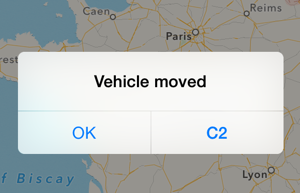-
Notifications
You must be signed in to change notification settings - Fork 183
apns
The apns service interacts with the Apple Push Notification Service (APNS) and
is a bit special (and one of mqttwarn's more complex services) in as much as
it requires an X.509 certificate and a key which are typically available to
developers only.
The following discussion assumes one of these payloads published via MQTT:
{"alert": "Vehicle moved" }{"alert": "Vehicle moved", "custom" : { "tid": "C2" }}In both cases, the message which will be displayed in the notification of the iOS device is "Vehicle moved". The second example depends on the app which receives the notification. This custom data is per/app. This example app uses the custom data to show a button:

This is the configuration we'll discuss.
[defaults]
hostname = 'localhost'
port = 1883
functions = 'myfuncs'
launch = apns
[config:apns]
targets = {
# path to cert in PEM format # key in PEM format
'prod' : ['/path/to/prod.crt', '/path/to/prod.key'],
}
[test/token/+]
targets = apns
alldata = apnsdata()
format = {alert}Certificate and Key files are in PEM format, and the key file must not be password-protected. (The PKCS#12 file you get as a developer can be extracted thusly:
openssl pkcs12 -in apns-CTRL.p12 -nocerts -nodes | openssl rsa > prod.key
openssl pkcs12 -in apns-CTRL.p12 -clcerts -nokeys > xxxx
then copy/paste from xxxx the sandbox or production certificate into prod.crt.)
The myfuncs function apnsdata() extracts the last part of the topic into
apns_token, the hex token for the target device, which is required within the
apns service.
def apnsdata(topic, data, srv=None):
return dict(apns_token = topic.split('/')[-1])A publish to topic test/token/380757b117f15a46dff2bd0be1d57929c34124dacb28d346dedb14d3464325e5
would thus emit the APNS notification to the specified device.
Requires: